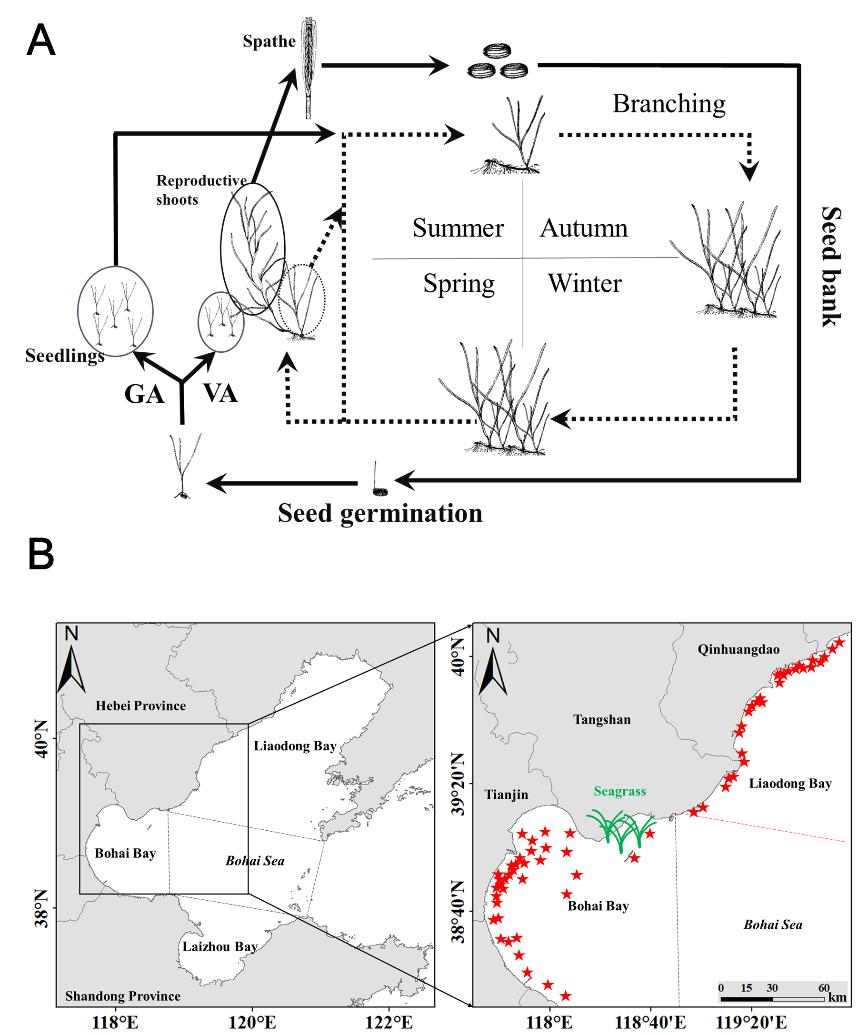Seagrasses are submerged marine angiosperms, which play key ecological roles in coastal ecosystems, including supporting high levels of biodiversity. The seagrass Zostera marina L. (eelgrass) is a marine foundation species and is the most widespread seagrass species throughout the Atlantic and Pacific coasts of the temperate northern hemisphere.
Bohai Bay, the representative semi-enclosed bay in northern China, has experienced severe eutrophication and overfishing in recent decades, causing frequent red tides and serious fishery degradation. There occurs a large eelgrass bed, with an area of 3217.32 ha, which was located in the northwest of the eutrophic bay.
Recently, the research team led by Prof. ZHOU Yi from the Institute of Oceanology of the Chinese Academy of Sciences (IOCAS) provided new insight into the variability in Z. marina population recruitment in the large seagrass meadow, and identified the nutrient status of seawater and seagrass, and their ecological interactions in this eutrophic bay in northern China.
The study was published in Marine Pollution Bulletin on Apr. 7.
Researchers investigated eelgrass shoot density, height, biomass, plant reproductive effort, and seed bank density to analyze the temporal dynamics of asexual growth and sexual reproduction of eelgrass. The nutrient status of seawater and seagrass and their ecological interactions in the large seagrass meadow was also determined.
Researchers found that eelgrass seedlings appeared from April to July, and their density reached the highest level (~220 shoots m-2) in May before decreasing. No seedlings were found in vegetated areas in June 2019, although a considerable number of seedlings, with a density of about 110 shoots m-2, survived in the eelgrass meadow gaps. Vegetative shoot density significantly increased during autumn sampling period, with vegetative shoot density increasing more than four times.
"Asexual growth played an important role in the maintenance of existing meadows, and sexual reproduction played a critical role in the colonization of new areas. We suggest that adult eelgrass shoots do rule the fate of seedlings in the large seagrass meadow, and our results will provide fundamental information for successful large-scale eelgrass restoration in northern China," said Dr. XU Shaochun, first author of the study.
Researchers also analyzed nutrient concentrations in seawater and seagrass, and concluded that nutrient resources Nitrogen (N) and Phosphorus (P) at this location were found to meet eelgrass growth demand. The N/P ratios of seawater and seagrass indicated N limitation relative to P in the eutrophic bay based on the seagrass Redfield ratio (25-30).
"Annual seagrass nutrient demands may reach approximately 6.84 g N m-2 y-1 and 0.86 g P m-2 y-1. Therefore, the nutrient requirements for eelgrass growth in the largest eelgrass bed in China with an area of 3217.32 ha could reach about 220 and 28 tons y-1, respectively. Overall, it is likely that the effective nutrient uptake by seagrass plays an important role in reducing the probability of a red tide in the study area," said Prof. ZHOU, the corresponding author.
This research was supported by the National Key Research and Development Program of China, the National Science & Technology Basic Work Program, the Key Research Project of Frontier Sciences of CAS, the National Natural Science Foundation of China, and the Shandong Provincial Natural Foundation, etc.

Seasonal variability of Zostera marina sexual and asexual reproduction (A), and map showing red tide occurrences in Bohai Bay from 2000 to 2016 (B)
Xu S, Xu S, Zhou Y, Yue S, Zhang X, Gu R, Zhang Y, Qiao Y, Liu M, Zhang Y, Zhang Z. (2022). Do adult eelgrass shoots rule seedling fate in a large seagrass meadow in a eutrophic bay in northern China? Marine Pollution Bulletin, 178: 113499.
XU Shaochun, ZHOU Yi
Institute of Oceanology
E-mail: xushaochun@qdio.ac.cn; yizhou@qdio.ac.cn
(Editor: ZHANG Yiyi)
|
|

Address: 7 Nanhai Road, Qingdao, Shandong 266071, China
Tel: 86-532-82898902 Fax: 86-532-82898612 E-mail: iocas@qdio.ac.cn


